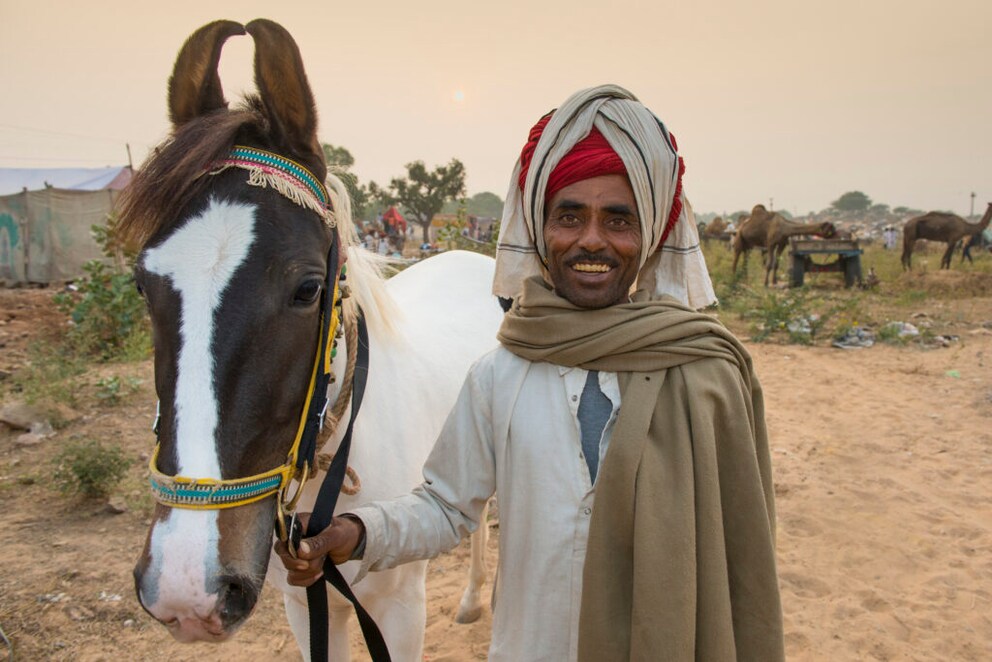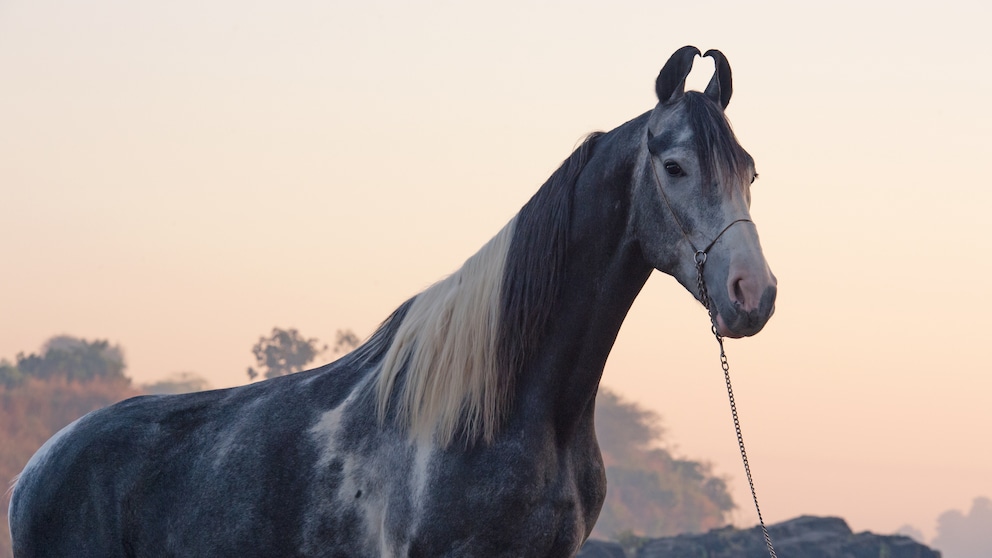July 8, 2024, 2:40 am | Read time: 5 minutes
Their curved ears are unmistakable – the Indian Marwari horses have a history that goes back centuries. Once revered as legendary war horses, they are now considered a rare breed. PETBOOK tells their story and has spoken to the only Marwari breeder in Germany.
Just one look at the Marwari horse is enough to recognize its most special feature: its sickle-shaped ears. The Marwari horse breed’s origins trace back hundreds of years in India. It is steeped in legend and narrowly escaped extinction in recent times. Despite being bred by enthusiasts in areas beyond India’s borders, Marwari horses remain a rare breed. PETBOOK introduces these special horses and has interviewed the first Marwari breeder in Germany, Swantje Schabehorn.
Overview
Brave and reliable war horses
The origin of this medium-sized horse breed is the arid region of Marwar in what is now Rajasthan, a state in north-west India. Marwari horses were first bred in the 12th century as cavalry horses. They were known and loved for being robust, brave, and reliable. According to reports, their exceptional sense of direction allowed them to independently return wounded soldiers from the battlefield, which exemplified their valued traits. The horse breed can also be characterized by its excellent hearing, which is another useful trait in battle.
Marwaris are actually desert horses
Even today, this horse breed still shows the influence of the arid region in which it originated. They have less sloping shoulders than other breeds. This allows them to easily pull their legs out of deep desert sand. They are also well-adapted to temperature extremes, and have hooves that are known for their remarkable resilience.
Marwari horses are particularly well suited to endurance riding. One of Swantje Schabehorn’s stallions is currently being used for endurance riding, the Marwari breeder from Rhineland-Palatinate tells PETBOOK. “Endurance is what we focus on the most. But in the future, Marwaris should also prove their ability in other disciplines,” she adds.
Marwaris are gaited horses. In addition to walk, trot, and canter, they also master another gait, called Revaal or Rehwal. This one is fast and with a rhythm of four beats, which makes for a pleasant ride. This gait allows the horses to traverse long distances with speed and grace.
Once threatened with extinction
In the early 20th century, there was both political and economic turmoil in India. As a result, the number of Marwari horses declined massively and the breed almost died out. Another contributing factor was that the British, the predominant colonial power in India at the time, preferred thoroughbreds and polo ponies. They also brought many horses from Australia to India.
India’s independence was followed with the formation of a modern society. However, this increasingly displaced the former warrior culture and Indian nobility, and with it the reliable Marwari horses. By the 1950s, the breed had practically ceased to exist, with only a few bloodlines surviving thanks to the efforts of Maharaja Umaid Singhji and his grandson Maharaja Gaj Singh II.
Almost 45 years later, in 1995, the number of horses with curved ears experienced a further upswing. The British rider Francesca Kelly founded the “Marwari Bloodlines Group” to not only preserve the breed, but also to promote it. The first breeding standard followed later, after Kelly, Raghuvendra Singh Dundlod and other horse lovers founded the so-called “Indigenous Horse Society”.

Genetic study shows the origins of the Marwari breed
There are various legends about the origins of the Marwari horses. The mapping of the entire genome of the breed in 2014 was the first of an Asian horse breed. This study also provided clear evidence of the origin of the horses’ genetic material. Genetic material of Arabian and Mongolian horses showed up.
Stories that local ponies may have been crossed with Arabian horses brought to the region were confirmed by this genetic analysis. Even a legend that surviving Arabian horses from a sunken ship were crossbred could possibly be true.
The only Marwari horses in Germany
Swantje Schabehorn from Rhineland-Palatinate reports to PETBOOK that the Marwari population in India has now stabilized. The horse breeder has been keeping the only Marwari horses in Germany since 2019. Outside of India, it is difficult to get a hold of this special breed of horse. This is due to the fact that India has imposed an export ban on the horses since 2000. Isolated exceptions to acquire the horses have only been made for a few horse lovers.
Under the care of Schabehorn, two horses have now become eight. Two piebald fillies were added this year. The Marwari breeder also explains: “Unfortunately, stud books, breeding selection etc. are still in their infancy. That’s why the breed is not yet as ‘stable’ and managed as other breeds.”
What makes the Marwari horse so special
Perhaps the most distinctive characteristic of the Marwari horse is its ears. They are curved, sometimes so much so that the tips touch. Additionally, they have the unique ability to rotate their ears 180 degrees. The interpreted meaning of the shape of its ears is often of a spiritual or religious nature in India, explains breeder Swantje Schabehorn when asked by PETBOOK. “Indeed, Marwaris’ ears are notably more flexible than those of other horse breeds. This is believed to help them shield against desert sand and more accurately pinpoint sounds,” the breeder explains.
For the horse lover and rider, however, it is not just the curved ears that make this breed of horse very special. “Marwaris are very independent,” Schabehorn told PETBOOK. “However, once they bond with ‘their’ owner, they exhibit incredible loyalty and can be depended upon in all circumstances.”

Is Horse Riding Considered Animal Cruelty? An Expert Weighs In

These are the rarest horse breeds in the world


